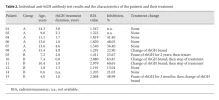The doctor works in a hospital, I doubt GLP-1 are a huge thing there, he seems more personally motivated, because of his success with it.
Regarding the immunity, I think this has been asked before, but can we say for sure, that developing immunity towards reta for example, reduces our sensitivity to the 3 different mechanisms of action (glp, gip and glucagon). Like some sort of downregulation or permanent tolerance?
Immunogenicity isn't binary, it's a sliding scale. At low levels, its effect can be inconsequential.
No protein based drug is unaffected by high levels of immunogenicity. None. It's only a question of how much must be induced before it's a problem.
The huge effort put into keeping immunogenicity to a low, clinically insignificant level is a top priority and worked out prior to the first human being injected in a trial. The FDA requires this.
The goal is to keep it low, and stable. If it continues to rise, dose after dose, sooner or later the efficacy of the drug WILL be reduced. There are potentially even worse consequences, but we'll keep it simple for this discussion.
If any factor known to increase immunogenicity is changed, from dose frequency, to manufacturing method, to the very container it's supplied in, immunogenicity must be reevaluated to the FDA's satisfaction. The material used as a stopper in a container is sufficient to cause enough aggregation particles to develop, a protein drug can become useless after several doses.
In UGL, and the haphazard ways the drugs are used, you quite literally couldn't. do much more if your goal was to deliver a peptide in a way that MAXIMIZES the immunogenic reaction.
The big tell really ought to be the number of people using UGL for whom these drugs fail to produce the same good results seen in the trials.
As for how long immunogenicity lasts? Like a vaccine, it can be short, long, somewhere in between, or permanent.
In the case of human growth hormone, where immunogenicity has been observed developing to the point GH stops working, sometimes a break of 3 months is enough, sometimes 2 years, and sometimes antibodies remain indefinitely and unfortunately in the case of children, never goes down and their window of growth opportunity is lost forever. See "stop treatment" below, and the amount of GH effectiveness lost ("inhibited") even in cases where treatment continued.
This is no joke, and the idea it's an obscure "bubble boy" topic borders on insanity.



